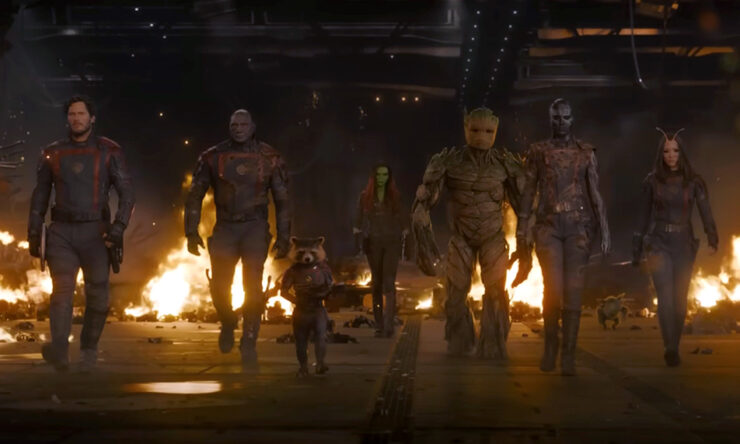Here’s a sentence I never thought I’d write: what’s up with all these Marvel movies beefing with God? While Thanos and Kang are not literal gods, they each impose their god-like will across the universe/multiverse. Thor: Love and Thunder had like 12 or 13 plotlines, including Gorr the God Butcher traveling from world to world and John Wicking every deity he could find with the Necrosword.
And now we get Guardians of the Galaxy Vol. 3, where James Gunn ups the ante on his religious imagery. I wasn’t that surprised to see some of it, because Gunn has played with this imagery before. He explicitly referred to Groot as a Christ figure, talked about Rocket’s spiritual journey in interviews—and if we go back to his earlier films, 2010’s Super is far more a fable about religious crisis than it is about superhero lore. (I mean, there’s even a Bibleman parody!) What did surprise me was going back through the whole Guardians trilogy and realizing that it’s always been “about” religion, or more specifically about working through religious trauma.
Join me below for trauma! So much trauma! And spoilers!
In Guardians Vol. 3 Gunn gives us: Swole Groot With Angel Wings, an organic space port that I can only describe as a Biblically-accurate vagina, not one but two pieta-based images, Adam Warlock and Peter Quill mimicking the Creation of Adam section of the Sistine Chapel ceiling, not one but three miraculous resurrections, and I haven’t even gotten to Rocket’s trip to heaven.
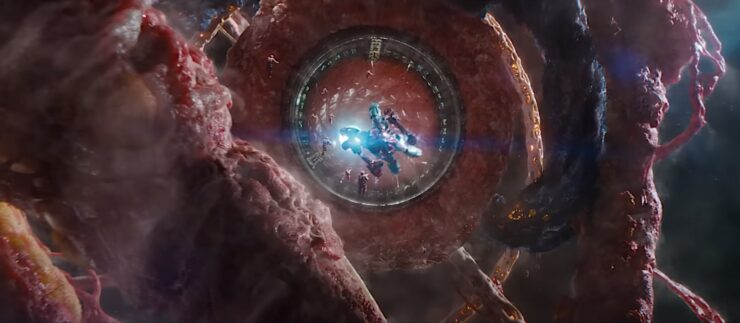
What’s that? You’re startled about Rocket going to heaven? So was I!
Quill and Nebula find a killswitch embedded amidst Rocket’s genetic modifications—a killswitch that Quill accidentally activates. Rocket spends most of the movie in a coma, with only days to live, while the other Guardians race around collecting MacGuffins to save him.
And (spoiler alert!) they fail.
Gunn ties the whole movie to this quest to save Rocket, sending the remaining Guardians through heists, cons, fights, and finally the face-off with the man who made Rocket what he is. They do their best, they get what they need, they bring the MacGuffin back just in time—and then the code doesn’t download fast enough to stop the killswitch. Quill is reduced to a sobbing mess—a mirror to his losses of his mother, Yondu, and Gamora. This is a perfect thing to do to the Guardians, a team who were defined in their first outing together as “losers”—both people who have lost something, as Quill hastily explained after insulting his new friends, and people whom society has counted out, underestimated, imprisoned, reviled. Of course they lose. Of course Rocket dies. Of course it’s Alternate Gamora watching Quill, sympathetic but removed. Of course Groot comes in only a moment later to wrap Quill in his limbs and try to comfort him.
But meanwhile, in Heaven— actually, hang on. We’ll come back to that.
Vol. 3’s villain, the High Evolutionary, starts off as your garden-variety Mad Scientist Tampering in God’s Domain. A square-jawed 1950s B-Movie hero would have made short work of him, but in the MCU he can run around doing his weird terrible experiments and building failed “utopias” on various planets and there’s so much going on that he’ll slip past the radar for centuries. He apparently stops off at Terra to pick up batches of animals and fuck with them. One of these animals was a tiny baby raccoon, who, for some reason, took to modification in ways the rest of his litter did not. He learned to speak, and discovered an aptitude for original thought and experimentation. He used his adorable little raccoon hands to steal parts of machines each time he was taken out for a training session or a demonstration of his talents, and discovered he could build things. New things. He was a tinkerer, like Tony Stark. A tortured, half-cyborg science genius, like Nebula.
But not to his Maker.
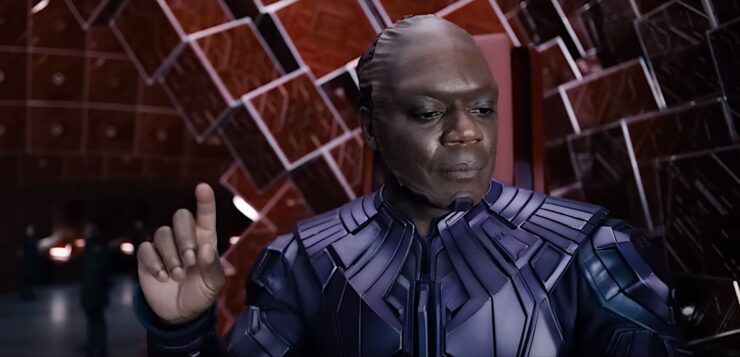
As far as the High Evolutionary is concerned, Rocket’s a failed experiment. This creates a theological nesting doll that would give Dostoyevsky a migraine. Rocket hates his creator—but his creator hates, well, creation, if you want to call it that. He looks upon the multiverse and sees only imperfection. He’s driven by the idea that he can improve on evolution, speed it up, throw a bunch of DNA coils in a blender and come out with an indestructible pig that has guns for hands. (Which, fair enough, those are sorely lacking in our current world.) During one of his training sessions with Rocket, he’s surprised by the child’s interest in the music that’s playing in the room. He translates the lyrics of the song they’re listening to as “Let us be as we as we should be, not as we are”—which is maybe kind of a reference to a 19th century Christian hymn—but is definitely rooted in the idea that there’s an ideal self that people should be reaching towards. I’m not against this! We should probably all try to keep learning and growing, otherwise what’s point? But there are a lot of assumptions packed into that word “should”, when taken in the context of the life with the High Evolutionary:
“Let us be as we should be”—well who decides how someone should be? Is it the person themself? Or some outside force? Is should a goal to be worked toward, or more of a prescription to be obeyed?
“not as we are”—again, what if the person likes being as they are? What if they’re content? Is there something inherently wrong with the way people are born?
In the High Evolutionary’s mind, “should” is a moving target, a goal that dances just beyond his reach throughout his long centuries of work. The High Evolutionary is driven by the idea that there’s some objective perfection that everyone else is falling short of. Rather than being dragged down into imperfection (i.e., reality) he decides that he’ll take evolution into his own hands for a speedrun.
By using a song that sounds a bit like a riff on a Christian hymn, I think Gunn is also gently poking at a central issue in Christianity—that human nature is fallen, corrupt, “what we were put on earth to rise above”, to quote The African Queen.
Buy the Book
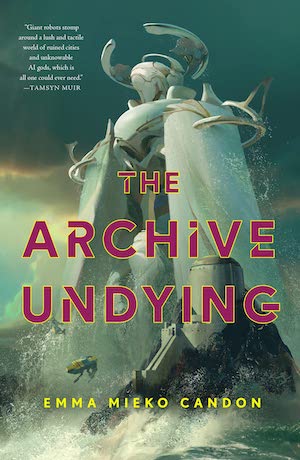

The Archive Undying
And sure, sometimes people aren’t born into their perfect bodies. The movie opens with Rocket singing along to Radiohead’s “Creep”, a song that strains after the idea that the narrator has neither a “perfect body” nor a “perfect soul”, but wants them (but also isn’t the song kind of a fuck you to the idea of perfection?). And sometimes people have to modify themselves in various ways to get closer to what they want to see in the mirror—whether that means gender confirmation or tattoos or investing a shit ton of money in Rose Gold Overtone—or use therapy, meditation, religious practice, whatever, to get closer to knowing themselves fully. But that’s their choice, not some High Evolutionary dickweed’s.
Of course some people would say it’s some variation on God’s choice, but that’s also the Evolutionary’s point: when one of his underlings makes the mistake of questioning one of his (genocidal) decisions, and says “For god’s sake!” for emphasis, her boss does the supremely reasonable thing of screaming “There is no god!” in her face, and follows it up with “So I’m taking the role”, which makes it clear that he sees his experiments not just as a scientific project, but also a religious one—and, I would argue, a moral one. No one should be content as they are, in the High Evolutionary’s mind, and he looks at other creatures and sees only clay to mold in an image of his choosing.
This view is a pretty close cousin to Ronan the Accuser’s disgust with the multiculturalism of Xandar, and outrage that there were people who didn’t accept his religion as the only true one. It’s pretty close to Ego’s plan to remake the universe in his image. Looking back at the Guardians trilogy I was startled by the realization that Gunn’s project has been a wrestling match with the idea of deity all along.
I’ve written at some length about how the MCU specifically deals with religious imagery because, to paraphrase Marge Simpson, I just think it’s neat! Imagine you’re Tony Stark and you’ve been a scientist since you were in the womb, and your rich parents probably take you to either an Episcopal or a Presbyterian church occasionally for high class weddings and VIP funerals, but you’re devotedly secular, and then suddenly you’re in a conversation with fucking THOR. Or, even better, you’re Matt Murdock, raised Catholic in a Catholic orphanage, and then suddenly a white dude named Stick is teaching you how to use Eastern (???) breathing techniques to heal faster (and it works) and you’re fighting immortal ninjas (what???) and again, fucking THOR is real.
How do you process that? Not just that aliens are real, but specifically aliens who inspired an IRL religion that you can read about. Does that make their religion more true? What does that mean for Your Guy? Where does that leave you? Does it change how you live your life?
I was surprised to go back through the trilogy and see that, with the exception of Thor Love and Thunder, the Guardians films seem to engage with these questions the most seriously.
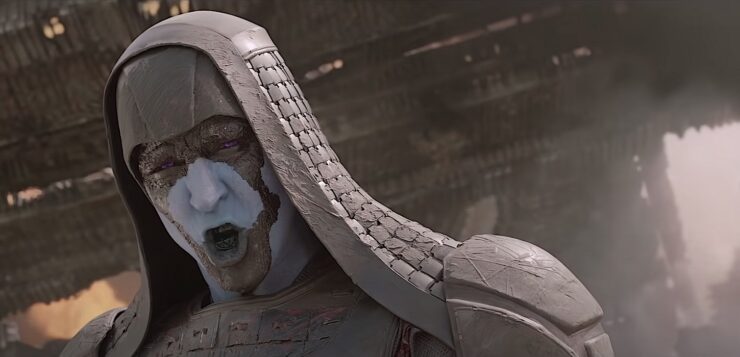
In Guardians Vol. 1, Ronan is a religious extremist. He believes in purity—purity of his culture, adherence to strict rituals and laws, and the objective truth of his religion. The reason he attacks Xandar, specifically, is that it’s multicultural, multiracial, multi-species, multi-religion—everyone’s welcome, everyone’s equal, and Ronan hates that shit. He hates that his people have debased themselves by agreeing to a peace treaty with people “beneath” them. He latches onto Thanos because Thanos will allow him to wage his tiny cult religious war, and Nebula and Gamora assist him because they have to spend all their time navigating Dad.
This is what makes the Guardians such a perfect foe for Ronan. A seemingly orphaned half-Terran who doesn’t know his father and who was adopted by piratical Ravagers; an orphaned Zehoberei who was “adopted” by Thanos; a genetically-engineered raccoon; a widowed Kylosian; a sentient tree. In addition to scoffing at Ronan’s morality, they’re also a walking found family rebuke to his idea of genetic purity and hierarchy.
And how do they defeat him? The tree goes Full Jesus, sacrificing himself for the rest of them and then resurrecting as a twiglet. (Or maybe it’s even better to say that he is Odin and World Tree made one?) The Half-Terran, like Kevin Bacon before him, strikes out at the religious zealot with the power of dance. The space raccoon uses the power of SCIENCE. And importantly, the half-Terran is able to wield an Infinity Stone because the other half of him is a Celestial. A god. So it’s not even that Ronan is defeated by a god he himself doesn’t follow, he’s defeated by a mixed race demigod.
Like I said, I just think it’s neat.
And this happens while Peter’s having a vision of his dead mom that might be a flashback or might be a vision of some sort of afterlife that he’s having as he’s dying, before Gamora grabs him and helps divert the stone’s power.
The second movie ups the ante. In Guardians Vol. 2, Quill meets his dad, Ego the Celestial (I don’t spend much time reading fanfic, but I HAVE to imagine there are stories about Peter and Gamora hosting Thanksgiving and having to deal with their Dads, right? If not, somebody write one.) and gets a very quick lesson in how to be a deity.
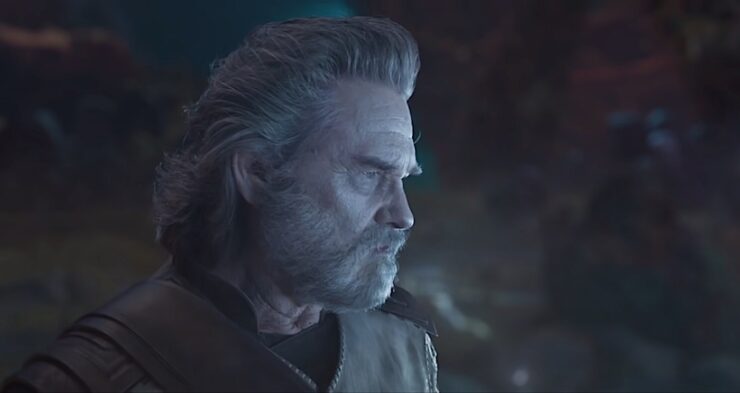
This god is a lying liar who lies. He initially tells Peter a lovely Genesis story: he was conscious, floating in a void, and realized it was Not Good. He was lonely! So he traveled through the universe looking for other life. When he finds it, he tries to connect with it, but it’s only when he meets Meredith Quill that he finds True Love. Now that he’s found their son, he will teach him how to claim his birthright, and the two will continue making Ego’s planet a Paradise.
Of course this is mostly made up. Ego was alone, but when he found other sentient life (or at least, life he considered sentient; given his derision for Rocket it’s likely that he, like the High Evolutionary, has rigid ideas about what counts as consciousness) he thought it was disappointing. Rather than thinking maybe he was the problem, he set about improving creating by replacing all of it with… himself. He does this no matter who he gives brain cancer in the process. He has murdered thousands upon thousands of his own children during attempted indoctrinations.
When Ego learns that Quill can actually wield their shared power, he tells him he needs to leave mortal things like the Guardians, Yondu, his love for his mother, and his Walkman behind, because “Only we can take the bridle of the universe and lead it where it needs to go.” Give up childish things, as it were. When Quill refuses, his dad—his Maker—says that he’ll be just as useful as a battery as he will as a partner. This time Quill saves himself and the rest of the universe by relying on his Terran half, with an assist once again from his found family and his adopted daddy, Yondu.
So again, a religious zealot almost wipes out the universe, and is only stopped by someone tapping into a part of themselves that the zealot sees as base and immature.
In Vol. 3, we catch up with a person who looks at the world around him and sees only mistakes. The High Evolutionary decides to take matters into his own hands and work toward a master race, and of course, what he comes up with is what mad scientists usually come up with—creatures that meet some of the requirements but have some perceived giant flaw that taunts their creator.
At first, his hyper-evolved specimens are so full of rage that they can’t be sent to the new world. On a whim he shows Rocket, whom he considers a lesser creation. Rocket, who thinks his creator is inviting him into the act of creation, figures out how to fix the problem and freely offers his solution. The High Evolutionary tries Rocket’s innovation offscreen, then gets drunk and shows the raccoon the successful results. When he asks Rocket how he saw the solution, Rocket can’t answer “how”—to him it was obvious. His Maker is enraged that his creation was able to find a solution he, the superior being, could not. When Rocket talks about going to the utopia, the High Evolutionary mocks his creation for thinking he has a place in paradise. His Maker informs him that he was made imperfect, a practice run, and that his only usefulness left is to be research subject so the Evolutionary can figure out how Rocket’s brain makes connections that no one else’s can.
Let me untangle a few thoughts. Rocket was a normal, goddamn adorable baby raccoon, presumably born as part of a raccoon litter (presumably the other little bbs we see in the cage with him) either on Terra or in the lab. We don’t see an adult raccoon, so presumably mom is long gone. But this isn’t “Rocket” yet, this is just a normal little raccoon. Where he maybe starts to become Rocket is when he stays in the front of the cage instead of running away when the High Evolutionary reaches in for test subjects.
This raccoon is transformed into Subject 89P13. 89P13’s creator is the High Evolutionary, and he sees 89P13 and the rest of his batch as test subjects, stepping stones to the more complex experiments that will populate Counter-Earth.
89P13 becomes Rocket. This is the name he chooses for himself with his own will.
The High Evolutionary is enraged that 89P13, which he sees as an object, his creation, his property, has surpassed him. He won’t use Rocket’s name, and he sees his mind not as a seat of a personality, but as a resource to be mined and stripped for parts.
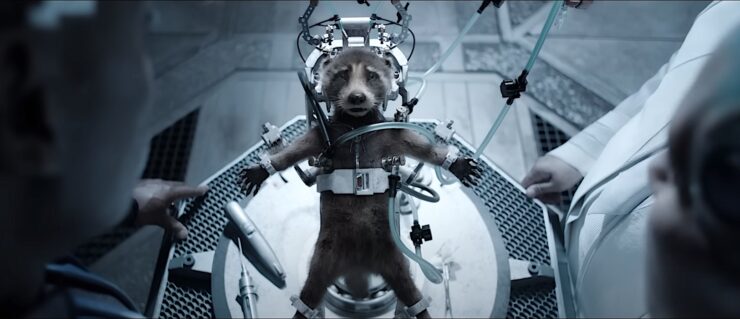
This is a little like Ronan thinking that all the other cultures are beneath him, and a little like Ego being happy to use Quill as a battery if his son won’t play ball. But more even than that, this is one person who believes he’s superior to all others, asserting his will on a creature he sees as an object. It’s a refusal to recognize sentience and free will in another. It’s also a creator who has a titanic meltdown at the idea that his creation has a creativity that he lacks.
The High Evolutionary’s creation is meant to serve him, to reflect him, not to out-do him. His creation is HIS, to do with as he pleases, and there’s a killswitch installed to prove it.
Which brings us back to Rocket in Heaven.
When Rocket flatlines he seems to be in the stereotypical Heaven Antechamber that’s used in a lot of afterlife fantasies. There’s a lot of light and mist and the vague outlines of your loved ones gathered around to impart wisdom. Think Ghost, or The Frighteners.
As is the way of these things, Lylla, Rocket’s best friend from their lab days, says vague, positive stuff about the afterlife—the beautiful sky goes on forever, etc.—before pushing him back into his body.
But where it goes in a slightly different direction is that Rocket, rather than being comforted to see his long lost friends again in Heaven, has a bit of breakdown. We’ve seen him cry when Groot died, we’ve seen him show a tiny hint of vulnerability during Yondu’s funeral. But this is a breakdown. He sobs and hides his face from Lylla. Back in Guardians Vol. 1 he got drunk enough that he let some of his pain show, screaming at Quill and Drax: “I didn’t ask to get made! I didn’t ask to get torn apart and put back together over and over and turned into some, some little monster.” Now, faced with the friends who were with him during that unmaking and remaking, he blames himself for their deaths, and wails that he was a mistake.
And Lylla replies that “There are the hands that make us, and then there are the hands that guide the hands.”
Which is, ummm… that “guide” could be a few different characters in the Marvel Universe. But this is the “kind of” in my title above. This trilogy is dedicated to overthrowing deities but still seems to want a fallback Cosmic Plan—in much the same way that Gorr butchered every god he could get his hands on, but still fell back into supplication when he encountered Eternity. Rocket surpasses his immediate creator (it’s taking all of my strength not to drag Henry Bergson and/or Teilhard de Chardin into this right now) but the film still wants the reassurance of a larger intelligence who has his back.
The High Evolutionary tells Recorder Vim that a species incapable of creative thought and innovation is doomed to extinction. He wants his creations to be like Rocket. He just can’t handle that Rocket, the test-case lower life form, is the one that can be creative. He wanted one of his “perfect” golden children to take on his mantle, to reflect his genius back to him. [ed. note: I found it interesting that H.E. seems almost manically optimistic about each new experiment group. Out of group 89 (which already, yikes) we only see him with Rocket, presumably because Rocket maybe shows more promise intellectually / creatively than the other three, even before Rocket fixes the problem with group 90. Once group 90 is “perfected” the H.E. focuses totally on that experiment, but of course we see that it eventually fails too. He just lets Counter-Earth chug along until he’s got the hyperactive children “perfected” for the next utopia. It’s you, H.E. You’re the problem, it’s you.]
Back in his body, Rocket has finally let go of the idea that he was a mistake. And here’s where the film infuriated me as I first watched it, but the more I think about it the better I like it. The last third of the film is Rocket going back to his genesis and rejecting objectification. Watching it the first time, I was exhausted by the reversals, the way the High Evolutionary kept showing up over and over again. The moment of relief when it seemed like Recorder Vim was going to take over, only to have him kill his advisors and keep fighting. The way Rocket comes upon the lab where he grew up, finds a new litter of kits, only to have that evil bastard show up AGAIN.
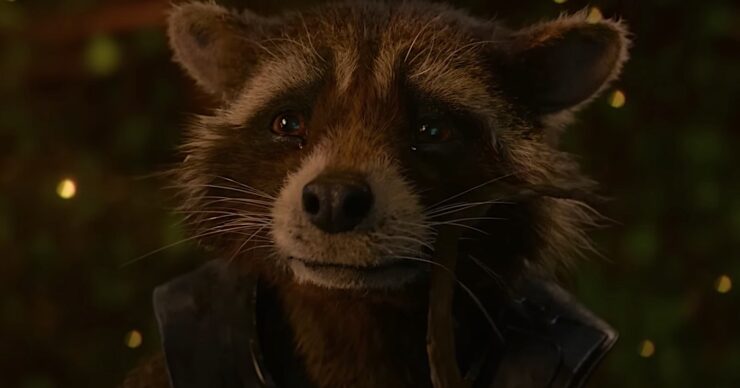
But that’s the point—it’s hard to overthrow a god. You can say “I know I wasn’t a mistake”, but that doesn’t mean you’ll believe yourself. So we get to the key scene in the film, the scene that’s stuck with me far more than the liminal heaven antechamber moment, or any of the 78 times Lylla said some variant on “FRIENDSHIP IS MAGIC”. Rocket, faced with that cage full of kits, gathers them up and puts them all on his back. In a mirror of the scene in the Kyln, where we, along with Quill, got a glimpse of the ports and scars that riddled Rocket’s body, now we see him holding a litter of kits there—a possum move, not a raccoon one, but I still find it moving that his response to the babies is tactile. It’s an instinctive expression of care that bypasses all of the High Evolutionary’s tinkering, and even his own insistence that he’s not a raccoon. And of course, once the High Evolutionary confronts him, he not only physically places himself between his Maker and the kits, he also claims the full name Rocket Raccoon for the first time.
The kits need him, so he saves them. And after his friends help him finally, finally, attack and dethrone the High Evolutionary, Rocket is the one who realizes that the Guardians’ well-meaning directive to save the “high lifeforms”—i.e., the enslaved children being shipped off to the High Evolutionary’s latest utopian experiment—is bullshit. They need to save everyone. He finally gets to use the key card he made when he himself was a kit—the first thing he ever made with his own hands—to free all the beings who would’ve been overlooked as “lower life forms” by anyone else.
In a trilogy where fundamentalism is defeated by the power of multicultural love and where an actual god is defeated by a demigod who embraces his messy, complicated humanity rather than taking his place at his father’s side, we have a would-be creator god who is humiliated and left to die by a creation he doesn’t even consider worthy of a real name. He rains fire upon the world he created, but a group of “lesser” lifeforms rescue his latest test subjects, load them all into the skull of a dead god like the most metal ark imaginable, and even convert Adam Warlock (the product of one the High Evolutionary’s previous Master Race attempts) to their cause. The new leaders of the group are neither Quill the demi-god, nor Kraglin the former right hand of Yondu—Rocket will lead the Guardians now, and Nebula, his sibling in genetic modification/torture, will lead Knowhere. The High Evolutionary is left to die alone on his ship while those he would subjugate fly off into a beautiful and forever sky to create their own utopia.
Leah Schnelbach identifies with the fictional genetically-modified murder raccoon too much! Whatever, it’s probably fine. Come join them in the heavenly antechamber that is Twitter!










